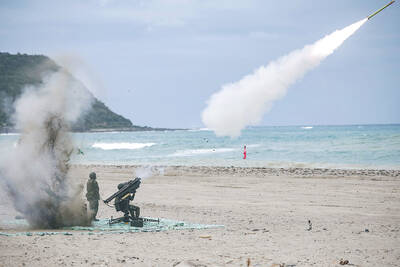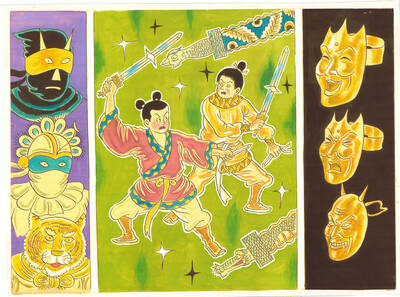Even though tomorrow’s Uanliu Music Festival (灣流音樂祭) features an all-Taiwanese lineup, virtually no Mandarin will be heard.
Instead, the sounds of some of Taiwan’s once-suppressed languages — Hoklo (commonly known as Taiwanese), Hakka, Atayal and Amis — will permeate the two stages and booths next to National Taiwan University’s (NTU) Drunken Moon Lake.
The eclectic lineup includes Hakka folk icon Lin Sheng-hsiang (林生祥), last year’s Golden Indie-winning fusion group ChuNoodle (春麵), Hoklo indie rockers Windmill (風籟坊) and Atayal chanteuse Yaway Mawring.

Photo courtesy of ChuNoodle
Put together and crowdfunded by members of the NTU Student Association’s native languages task force (本土語言小組) and NTU Taigi Bun Sia (台語文社, Taiwanese language club), the event is an attempt to get students to take interest in the issue of language endangerment and revitalization, which organizers say is often ignored.
Event coordinator Lim Liu-sin (林柔辰) says that the most popular social topics on campus are gender issues and transitional justice, but she has noticed more people expressing interest at least in learning Hoklo over the past year. A Taichung native, she grew up speaking the language and competed in reading competitions, but after she moved to Taipei she found that there were virtually no opportunities to use it.
“Only then did I realize that the Taiwanese language is disappearing and how important the issue is,” she says.
Co-organizer Liau Tsun-khai (廖俊凱), whose parents spoke it at home but never to him, also experienced the same thing after moving to Taipei.
On the other hand, although most of Jay Wei’s (韋晢) family came to Taiwan from China in 1949 and his mother tongue is Mandarin, he joined the native languages task force because he sees these languages as a way of establishing a distinct Taiwanese identity, and is also crucial to transitional justice.
However, the students believe that the only way to truly preserve these languages is full immersion — rather than having one class in their mother tongues and the rest in Mandarin. Documentary filmmaker and Aboriginal rights activist Mayaw Biho, who is running an Amis-language immersion preschool in Hualien, will speak about this as one of the guests.
“The biggest obstacle right now is that ... most people are too accustomed to speaking Mandarin,” Lim says. “We can only strive to use our mother tongues more, and start by establishing small speaking groups and gradually expand and connect them.”
Lim’s hope is that one day, it will be a very natural practice to call someone by their name in their mother tongue instead of Mandarin.
“That means that these languages are being used on a daily basis,” she says.
Liau wishes that people see these languages less as tools but as carriers of culture, and that any Taiwanese can feel comfortable learning whichever one they are interested in.
“I don’t want people to think that if you have no practical use for Amis, or if you’re Hakka, then you should not learn Amis,” he says. “If you appreciate a certain culture, there’s no reason you can’t learn their language.”

In late October of 1873 the government of Japan decided against sending a military expedition to Korea to force that nation to open trade relations. Across the government supporters of the expedition resigned immediately. The spectacle of revolt by disaffected samurai began to loom over Japanese politics. In January of 1874 disaffected samurai attacked a senior minister in Tokyo. A month later, a group of pro-Korea expedition and anti-foreign elements from Saga prefecture in Kyushu revolted, driven in part by high food prices stemming from poor harvests. Their leader, according to Edward Drea’s classic Japan’s Imperial Army, was a samurai

Located down a sideroad in old Wanhua District (萬華區), Waley Art (水谷藝術) has an established reputation for curating some of the more provocative indie art exhibitions in Taipei. And this month is no exception. Beyond the innocuous facade of a shophouse, the full three stories of the gallery space (including the basement) have been taken over by photographs, installation videos and abstract images courtesy of two creatives who hail from the opposite ends of the earth, Taiwan’s Hsu Yi-ting (許懿婷) and Germany’s Benjamin Janzen. “In 2019, I had an art residency in Europe,” Hsu says. “I met Benjamin in the lobby

April 22 to April 28 The true identity of the mastermind behind the Demon Gang (魔鬼黨) was undoubtedly on the minds of countless schoolchildren in late 1958. In the days leading up to the big reveal, more than 10,000 guesses were sent to Ta Hwa Publishing Co (大華文化社) for a chance to win prizes. The smash success of the comic series Great Battle Against the Demon Gang (大戰魔鬼黨) came as a surprise to author Yeh Hung-chia (葉宏甲), who had long given up on his dream after being jailed for 10 months in 1947 over political cartoons. Protagonist

Peter Brighton was amazed when he found the giant jackfruit. He had been watching it grow on his farm in far north Queensland, and when it came time to pick it from the tree, it was so heavy it needed two people to do the job. “I was surprised when we cut it off and felt how heavy it was,” he says. “I grabbed it and my wife cut it — couldn’t do it by myself, it took two of us.” Weighing in at 45 kilograms, it is the heaviest jackfruit that Brighton has ever grown on his tropical fruit farm, located